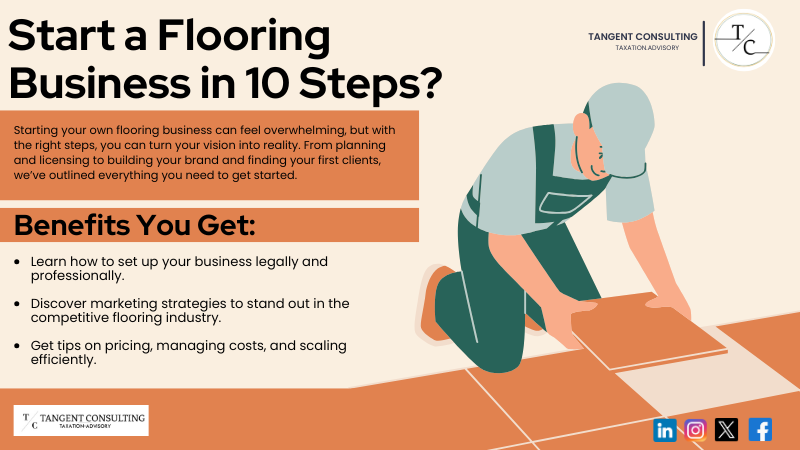Starting a Flooring Business? Consider these 10 Steps
Starting a Flooring Business? Consider these 10 Steps

Starting a flooring business is simple. That’s what John thought. A skilled flooring contractor, John decided to start his own flooring company after gaining years of experience.
When John started, he quickly realized that running a flooring business isn’t simple and requires more than just flooring skills.
If you are like John, this guide is for you. Here, we’ll break down 10 steps that can help you start a flooring business.

What You Need to Know About a Flooring Business?
According to Statista, the global flooring market was valued at $280.34 billion in 2023 and is projected to grow to $420.54 billion by 2030.
If you are looking to start a flooring business, these stats can signal a huge opportunity. However, tapping into the markets requires understanding the industry. You need to know about the flooring types, industry trends, and customer behavior. So, let’s break down the key areas you need to focus on before starting a flooring business.
Understanding Flooring Types and Trends
You need to be well-versed in the materials and trends that dominate the market. Homeowners are leaning toward sustainable options like bamboo and cork, while luxury vinyl planks remain a popular choice for their durability and affordability.
You can stay updated on industry trends by following trade publications and attending expos to understand what customers want.
Total Costs
Starting costs can vary widely depending on your business model. Equipment, materials, transportation, and marketing are some of the major expenses in a flooring business.
On average, setting up a small flooring business might cost between $10,000 and $50,000. If you can’t understand this, don’t; we’ll delve more into the costs later.

Starting a Flooring Business in 10 Steps
“The journey of a thousand miles begins with a single step.” – Lao Tzu
Lao’s quote rings true for everyone looking to start a flooring business. While the thought of launching your own company might seem overwhelming, every successful entrepreneur starts with one small action.
The good news? You don’t have to figure it all out alone. We have broken down the process into manageable steps. So, let’s start.
1. Register Your Business and Get Licensing
Before you start installing floors, you need to lay the foundation for your business—legally and professionally. Registering your business is the first official step toward making your flooring company a reality.
Registering your business means you need to choose the business structure. Here, you have three options: sole proprietorship, LLC, or corporation. Each has its own tax implications and liability protections.
After that, you need to get the necessary license and permits. Flooring businesses often require specific contractor’s licenses, depending on the materials you’ll work with. You’ll also need a general business license and possibly zoning permits if you operate out of a physical location.
Pro Tip: Don’t forget to get liability insurance. It protects your business from unexpected events, like accidental property damage during installation.

2. Do Market Research
Before you start, you need to understand the market you’re stepping into. Market research helps you identify your ideal customers, understand your competition, and spot opportunities in the flooring industry.
To do the market research, first, you need to define your target audience. Are you targeting homeowners, commercial spaces, or both? After that, you need to analyze your competitors by looking at the services they offer and how they are pricing them.
You also need to pay attention to what’s hot in the industry. For example, luxury vinyl tiles and engineered hardwood are trending, while sustainability is becoming a key concern for many clients. Staying ahead of trends can give you a competitive edge.
You can use online tools like Google Trends, industry reports, and even social media platforms to check what potential customers in your area are searching for.
3. Create a Business Plan
According to a study by Palo Alto Software, businesses that create formal plans are 30% more likely to secure funding.
A business plan isn’t just a document—it’s a blueprint for running a successful flooring business. It should outline your goals, services, market research, and financial plan.
Pro Tip: Keep your business plan flexible. As your business grows, you need to revisit and revise it to align with new goals.

4. Get Funding
Securing funding ensures you have the resources to start and sustain your business during the early stages.
The first step in getting funding is to list all the expenses like tools, office setup, and marketing, and then assess how much you need. Once you have figured them out, you have different funding options like personal savings, small business loans, and securing investments.
5. Set up Costs
Setting up a flooring business involves strategically investing in everything you need to run your business operations while staying within your budget.
Here are some of the costs you need to calculate:
- Tools and equipment
- Transportation
- Inventory
- Office space
- Marketing costs
- Licensing and insurance, and others.
Pro Tip: Keep track of all receipts and expenses from day one. Not only will this help with budgeting, but it’ll also come in handy during tax time.

6. Get Business Accounting
“Why did the flooring contractor bring an accountant to the job site? Because he didn’t want his profits to fall through the cracks!”
As cheesy as that joke may be, it hits close to home for many small business owners. Without proper accounting, your flooring business can have a lot of cash flow problems.
To get business accounting, you have two options. The first one is the DIY method, in which you have to do accounting on software like QuickBooks.
If numbers aren’t your favorite thing, you can hire an accountant or outsource bookkeeping on a part-time basis.
7. Open a Business Bank Account
If your personal and business finances are in the same account, it’s time to draw the line. Opening a dedicated business bank account is one of the simplest yet most crucial steps to running a flooring business.
A business bank account does more than just hold your money—it helps establish credibility, simplifies tax preparation, and protects your assets by keeping them separate from business liabilities.
If you are looking to open a business bank account, we have partnered with Ramp to give you a $500 free signup bonus. You can signup here.

8. Get Necessary Equipment
The tools and machinery you invest in will directly impact the quality of your work, the time it takes to complete projects, and, ultimately, your reputation. It’s an investment that pays off in happy clients and repeat business.
Some of the essential tools include:
- Power Saws
- Nail Guns and Staplers
- Trowels and Spreaders
- Sanders and Buffers
- Floor Scrapers
- Moisture Meters
- Tape Measures and Laser Levels
- Chalk Lines
- Safety Equipment
- Gloves and Work Boots
9. Promote Your Business
You can have the best flooring skills in town, but if no one knows about your business, it won’t matter. That’s why you need a solid marketing strategy.
To promote your business
- Create a professional website.
- Do social media marketing.
- Get listed on local directories like Google My Business and Yelp.
- Build Relationships with Contractors and Designers
- Invest in Digital Advertising

10. Hire Employees
As your flooring business grows, you’ll reach a point where you can’t do it all alone—and that’s a good thing! Hiring employees allows you to take on more projects, improve efficiency, and focus on running the business instead of doing all the installations yourself.
The right team can make or break your business. Skilled employees not only ensure high-quality work but also enhance your reputation.
Decide what roles you need to fill. Do you need installers, project managers, or administrative staff? Start with the most critical positions and expand as needed.
Final Thoughts
So, there you have it! Starting a flooring business isn’t easy, but with the steps mentioned above, you can get started in no time.
Speaking of getting started, isn’t it good to hire someone who can help you get started?
Tangent Consulting has years of experience working with landscaping businesses in bookkeeping, CFO services, tax preparation, and business consulting.
PS If you are reading this, it means you can have access to our free consultation for your landscaping business. Avail this for free today before we change our mind 😉
FAQs
Is the flooring business profitable?
Yes, the flooring business can be highly profitable, especially with the industry’s steady growth and high demand.
How to grow my flooring business?
To grow your flooring business, you can do online and offline marketing, build strong relationships with contractors, and provide excellent customer service.
Is it possible to start a flooring company with little capital?
Yes, you can start small by offering subcontractor services, reinvesting early profits into growth, and keeping overhead costs low.
